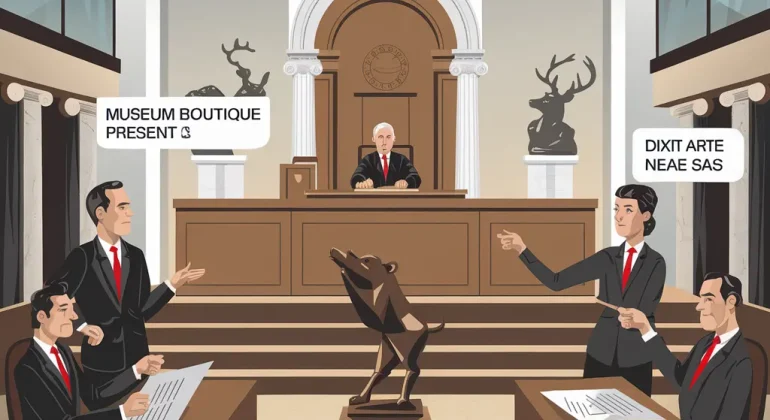French Trademark Office INPI Decision of September 13, 2024: Bad Faith Trademark Filing and Its Implications
The INPI’s decision of September 13, 2024, in case NL 23-0183, addresses the critical issue of bad faith in trademark law. The cancellation of the “POMPON” trademark, which was registered to monopolize a name linked to the renowned sculptor François Pompon, underscores the misuse of intellectual property rights for undue commercial advantage. This article dissects the legal reasoning, evidence, and implications of this decision for businesses operating in intellectual property and cultural heritage sectors.
Case Summary
Background
The trademark “POMPON,” registered by a museum boutique operator, faced cancellation proceedings initiated by Dixit Arte SAS. The latter argued that the registration aimed to monopolize the name “Pompon,” associated with the renowned sculptor François Pompon, whose works are part of the public domain.
Key Arguments
At the heart of the case were allegations of bad faith. The plaintiff contended that the trademark holder sought to exploit the public domain status of François Pompon’s name by imposing licensing fees on other legitimate users. This was seen as an attempt to gain undue control over a name that should remain accessible to all stakeholders within the art and heritage sector. The registrant countered that the trademark was filed to protect the integrity of Pompon’s legacy and ensure high-quality reproductions.
Legal Framework
Establishing Bad Faith
The INPI based its decision on Article L.714-3 of the French Intellectual Property Code, which allows for the cancellation of trademarks filed in bad faith. It requires a comprehensive assessment of the registrant’s intent at the time of filing, as established by European case law. Factors such as knowledge of prior use by third parties and the broader context of the registration play a decisive role in determining bad faith.
The Role of Evidence in Establishing Intent
Key factors included the registrant’s activity as the manager of museum boutiques in Dijon, which gave him direct exposure to Dixit Arte’s products. Additionally, email correspondence proposing royalty-bearing licenses substantiated the claim that the registration was a deliberate attempt to monetize a name integral to the public domain. The registrant’s argument of safeguarding the artist’s legacy was found to lack credibility given the financial motivations reflected in the evidence.
Decision and Implications
Cancellation of the Trademark
The INPI concluded that the “POMPON” trademark was filed with the intent of creating an undue monopoly on a public domain name. By restricting access to a term essential for the reproduction and sale of François Pompon’s works, the registrant sought to exploit the trademark system in a manner inconsistent with its intended purpose.
Implications for Future Trademark Applications
This decision underscores the necessity of ensuring good faith in trademark applications, particularly in cases involving public domain elements. Businesses must exercise due diligence to confirm that their filings align with the principles of fairness and do not obstruct legitimate commercial practices. This ruling also highlights the importance of preserving access to cultural heritage symbols for all stakeholders.
Broader Lessons from the Decision
Safeguarding Public Domain Names
The decision underscores that names linked to public domain works, such as those of François Pompon, should remain freely available to stakeholders. Attempts to impose exclusivity through trademark registration risk contravening the principles of intellectual property law.
Ethical Licensing Practices
The case serves as a reminder of the importance of transparency and fairness in licensing agreements. Leveraging trademarks to extract royalties on public domain names undermines the spirit of free competition and innovation.
Conclusion
The cancellation of the “POMPON” trademark by the INPI sets a precedent against bad faith filings, emphasizing the need for ethical practices in intellectual property management. Businesses must align trademark strategies with the principles of fairness and competition.
For expert guidance on trademark filing and enforcement strategies, subscribe to our newsletter and follow us on LinkedIn and Twitter. Stay informed about critical updates in intellectual property law and leverage our expertise to safeguard your brand’s integrity.
Our firm specializes in trademark protection, ensuring compliance with legal frameworks while maximizing commercial value. Contact us to discuss tailored strategies for your business needs.
For more insights into navigating trademark filings and intellectual property strategies, subscribe to our newsletter and follow us on social media. Our team specializes in providing comprehensive, client-focused advice to help you protect your brand and ensure compliance with evolving legal standards.
The Dreyfus firm collaborates with a global network of intellectual property specialists.
Follow us on social media!
FAQ
What is bad faith in trademark?
Bad faith in trademark law refers to a situation where an applicant files for a trademark with dishonest intentions. This may include registering a mark solely to block competitors, exploit the reputation of an existing brand, or prevent others from using a term that should remain available in the public domain.
What is bad faith EU trademark?
In the EU, bad faith is defined under Article 59(1)(b) of the EU Trademark Regulation. It applies when a trademark application is filed with the intention of misleading, obstructing competitors, or unfairly benefiting from another party’s reputation. The European courts assess factors such as prior knowledge of third-party use, the applicant’s commercial strategy, and any attempt to abuse trademark law.
How do you cancel a trademark?
A trademark can be canceled through invalidity or revocation proceedings:
- Invalidity: If the mark was registered in bad faith, lacks distinctiveness, or infringes prior rights.
- Revocation: If the trademark has not been used for a continuous period of five years or has become misleading to consumers.
Proceedings can be initiated before the relevant intellectual property office (e.g., EUIPO, INPI) or in court, depending on the jurisdiction.
How to withdraw a trademark?
A trademark can be withdrawn voluntarily by submitting a request to the relevant trademark office. The applicant or owner may request total or partial withdrawal, meaning it may apply to all goods/services or just specific ones.
How do you protect your domain name?
To protect a domain name:
- Register it promptly to prevent third-party claims.
- Monitor for potential cybersquatting using watch services.
- Secure trademarks corresponding to the domain name, strengthening enforcement rights.
- Enforce rights through legal actions, such as Uniform Domain-Name Dispute-Resolution Policy (UDRP) or national court procedures.
What are the conflicts of trademarks with domain names?
Conflicts arise when a domain name incorporates a registered trademark without authorization. Key issues include:
- Cybersquatting: A third party registers a domain with the intent to profit from the trademark owner.
- Trademark infringement: If a domain creates confusion among consumers, misleading them into thinking it is affiliated with the trademark owner.
- Reverse domain name hijacking: When a company tries to obtain a domain name illegitimately by claiming false trademark rights.
Resolving such conflicts may involve legal action under UDRP, court proceedings, or negotiations with the domain holder.





